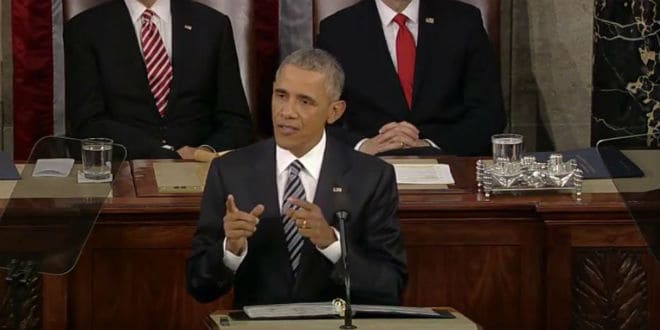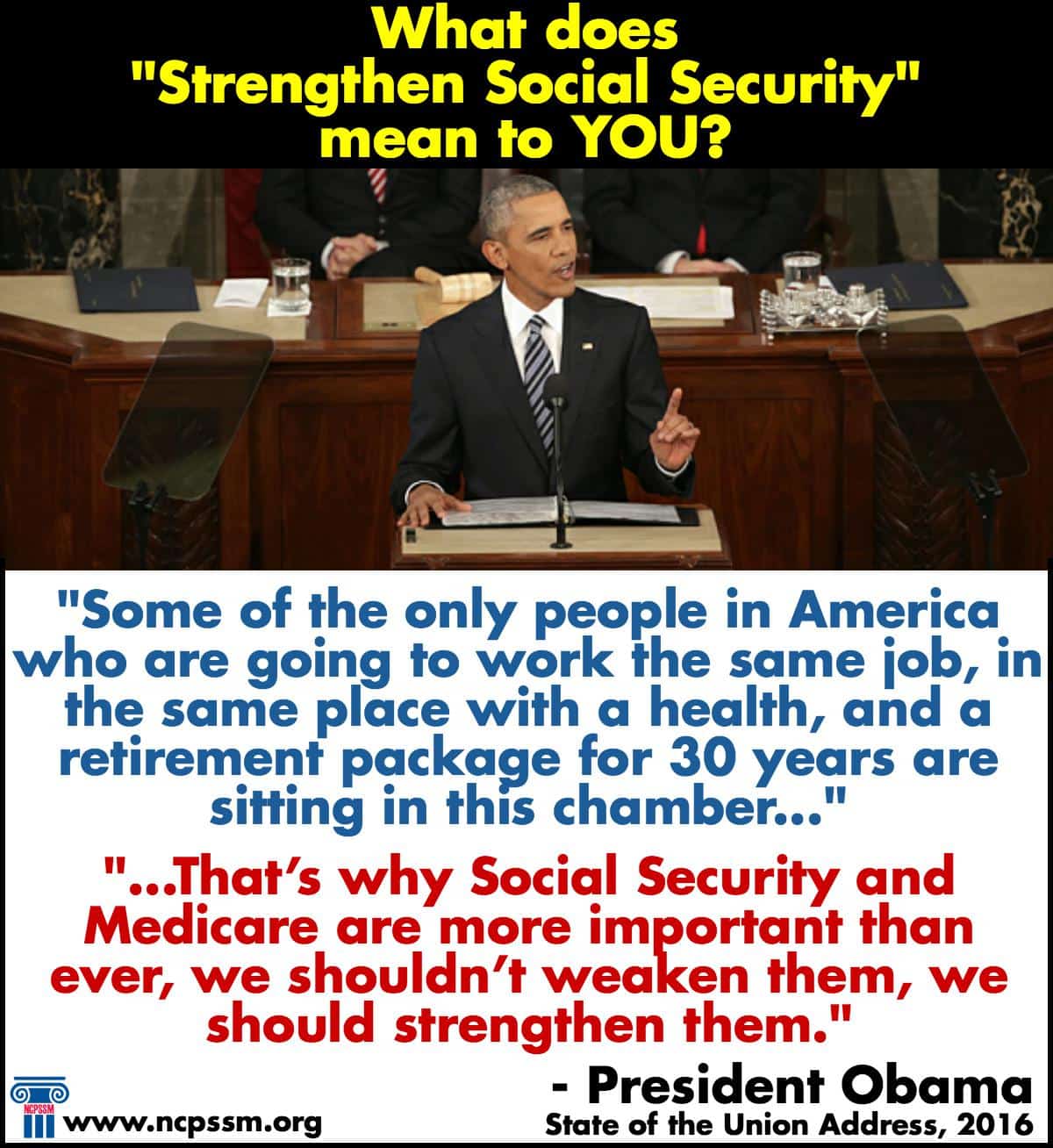Iowa Caucuses Today: Social Security is a Key Issue
 According to the Iowa Secretary of State’s office, in 2012 85 percent of registered voters 65 and older — the main beneficiaries of Social Security — cast ballots compared with about half of voters under 35. It should be no surprise then that a recent AARP survey of Iowa voters, Democrat and Republican caucus goers, showed that the vast majority consider Social Security a key campaign issue.
According to the Iowa Secretary of State’s office, in 2012 85 percent of registered voters 65 and older — the main beneficiaries of Social Security — cast ballots compared with about half of voters under 35. It should be no surprise then that a recent AARP survey of Iowa voters, Democrat and Republican caucus goers, showed that the vast majority consider Social Security a key campaign issue.
“When polled on the importance of candidates focusing on Social Security, the survey found that more than nine in 10 Iowa caucus goers think it is important for presidential candidates to have a plan for the future of the program. Regardless of age, more than half of all likely caucus goers think this is ‘very important.’
“When asked if they have heard enough about the candidates’ plans for the future of Social Security, 51% of Democratic caucus goers said they’d like to know more about Hillary Clinton’s plans, and 38% would like to know more about Bernie Sanders’ plans. Among Republican caucus goers, 45% would like to know more about Donald Trump’s plans, and 41% would like to know more about Ted Cruz’s and Marco Rubio’s plans.”
Social Security has played a key role in Senator Bernie Sanders’ campaign as he continues to draw distinctions between his and Hillary Clinton’s plans. Bloomberg reports:
“Sanders wants to keep the cap on taxable income for Social Security at the current $118,500 a year for those earning up to $250,000 annually, and apply the levy on all earnings above that amount. It would mean the top wage earners would pay more to extend the solvency of the program and expand benefits by $1,300 a year for people making less than $16,000, he said. ‘That is my view, to the best of my knowledge, that is not Secretary Clinton’s view,’ Sanders told reporters on Tuesday after a campaign stop in Des Moines
“I think it’s a mistake to go in and say, ‘Here’s what I want to do,’ sort of in effect hand them your negotiating position,” Clinton told the Des Moines Register editorial board earlier this month. “I think it’s smarter to say, ‘Look, I’m never going to go along with your privatization plan. I will not go along with raising the retirement age as the answer to everything that ails Social Security, but I will work with you to try to figure out how we help those people who are most disadvantaged.”
There are also differences between the two leading GOP candidates in Iowa, Donald Trump and Ted Cruz — at least on the campaign trail, that is. While Trump has supported privatization and raising the retirement age, in Iowa he promises to protect Social Security and Medicare. Cruz, meanwhile, has stated his plans to cut benefits, privatize Social Security, and convert Medicare into CouponCare very clearly.
The caucuses begin at 7 pm Central time with separate Democratic and Republican events taking place in each of 1,681 precincts across the state. The Des Moines Register will be posting results throughout the night.



State of the Union 2016 : Will Washington Really Strengthen Social Security?



You don’t have to agree with his politics to acknowledge that President Obama’s final State of the Union address was, as promised, an aspirational and ambitious look forward. The New York Times summed it up this way:
“In a prime-time televised speech that avoided the usual litany of policy prescriptions, Mr. Obama used his final State of the Union address to paint a hopeful portrait of the nation after seven years of his leadership, with a resurgent economy and better standing in the world despite inequality at home and terrorism abroad.
He acknowledged that many Americans feel frightened and shut out of a political and economic system they view as rigged against their interests, even as he offered an implicit rebuke of Republicans who are playing on those insecurities in the race to succeed him.
‘As frustration grows, there will be voices urging us to fall back into tribes, to scapegoat fellow citizens who don’t look like us, or pray like us, or vote like we do, or share the same background,’ Mr. Obama said. ‘We can’t afford to go down that path.’ “
In a sweeping speech that touched on issues as diverse as curing cancer to fighting ISIS, retirement security played a small role. However, it did provide the President an opportunity to deliver one of his best one-liners of the night:
“After all, it’s not much of a stretch to say that some of the only people in America who are going to work the same job, in the same place, with a health and retirement package, for 30 years, are sitting in this chamber. For everyone else, especially folks in their forties and fifties, saving for retirement or bouncing back from job loss has gotten a lot tougher.
That’s why Social Security and Medicare are more important than ever; we shouldn’t weaken them, we should strengthen them.”
American families know first-hand what this looming retirement crisis feels like. About half of households age 55 and older have no retirement savings and a third of current workers aged 55 to 64 are likely to be poor or near-poor in retirement. Unfortunately, the median retirement account balance is a puny $3,000 for all working-age households and $12,000 for near-retirement households.
However, just as with the climate change debate, many conservatives continue to deny the retirement crisis even exists. This too often used head-in-the-sand political approach led the President to challenge his Congressional audience:
“How do we reignite that spirit of innovation to meet our biggest challenges?
Sixty years ago, when the Russians beat us into space, we didn’t deny Sputnik was up there. We didn’t argue about the science, or shrink our research and development budget. We built a space program almost overnight, and twelve years later, we were walking on the moon.”
Undoubtedly, acknowledging the economic challenges facing average Americans has to be the first step to find solutions; however, equally important is for citizens to hold their elected officials accountable for saying what they mean and meaning what they say. Too often, candidates promise to “strengthen” Social Security while on the campaign trail when, in truth, they actually support plans to slash benefits. They promise to protect Social Security and Medicare while actually planning to privatize them.
What does the candidate asking for your vote really mean when he/she promises to “strengthen” Social Security and Medicare? For the majority of Americans of all political parties, strengthen means no cuts to benefits. A growing movement also supports boosting benefits; however, voters can’t assume the same of candidates on the campaign trail in 2016.
So, our challenge to all voters is to ask each and every candidate who hopes to come to Washington,“What are your true plans to strengthen Social Security?”



The GOP Poverty Solution…Do Less and the Poor Will Do Better?!?



In 2014, 46.7 million people (14.8%) were living in poverty, according to the Census Bureau. The poverty rate for people aged 65 and older was lower, at 10%, thanks to the success of earned benefit programs like Social Security and Medicare. In spite of these programs’ undeniable success in providing improved income and health security for older Americas, GOP leaders in Congress and most running for President, continue to target Social Security and Medicare for cuts. They also have supported cuts to other vital safety net programs serving America’s poor.
While this weekend’s GOP Poverty forum may have signaled a shift to softer rhetoric on poverty (an issue that has seldom been addressed by Republican candidates, so far) there’s no sign that their policy prescriptions have changed at all.
Robert Greenstein is the founder and President of the Center on Budget and Policy Priorities and provides this Huffington Post analysis of the GOP’s primary poverty proposal:
“Our analysis suggests Paul Ryan’s “Opportunity Grant” proposal carries substantial risk of increasing poverty, rather than reducing it, for the following reasons:
- Although Speaker Ryan has described the proposal as maintaining the same overall funding for anti-poverty programs, that would be a practical impossibility.
- Funds would likely be shifted away from direct assistance to needy families.
- The proposal would jeopardize basic nutrition assistance for poor children, which research has shown reduces child malnutrition and improves children’s long-term prospects.
- Not only would food assistance funding likely decline, but total funding to assist low-income families would likely decline as well.
- History shows that when federal policymakers merge programs into a broad block grant, federal funding typically declines over time, often dramatically.”
Economist Jared Bernstein says:
“This is merely a gussied up version of “if your only tool is a hammer, then everything looks like a nail.” The idea, and Ryan’s budgets very much underscore this point, is that we can help the poor more by doing less for them.
The evidence points strongly in the opposite direction. As CBPP’s Arloc Sherman noted yesterday (and Ben Spielberg and I have explained in detail), a large and growing body of high-quality research…shows that the impact of income support and safety net programs like SNAP and Medicaid do not just occur upon receipt and immediately fade away. They have important, positive long-term benefits for children. Next, the idea that liberal policies have failed is belied by…you know…data.”
Paul Ryan’s long-held and often-expressed Ayn Randian view of every man for himself and claims that federal safety-net programs (including earned benefits in Social Security, Medicare) only provide a “hammock” for the “dependency culture” of “makers and takers” remain as the core value that fuels the GOP approach to poverty. Although, Speaker Ryan now acknowledges his “maker-taker” rhetoric was a mistake, that clearly hasn’t moderated his policy approach.
“Under his “Opportunity Grant” proposal, Ryan has proposed converting a number of programs to state block grants, a decision that nonpartisan analysis suggests would reduce families’ ability to access key programs such as nutrition and housing assistance. In crafting this idea, Ryan and other conservatives often point to the Temporary Assistance for Needy Families program as a model—even though it does very little to mitigate poverty and hardship and is unresponsive to recessions.
Furthermore, in their most recent congressional budgets, Republicans obtained two-thirds of their cuts from programs helping low- and moderate-income families, while channeling additional resources towards tax cuts for the wealthy.” The Nation
The GOP/Ryan budgets have all been characterized by tax cuts for the wealthy, program cuts for the poor and turning Medicare into “Coupon Care.”
“Once again, the House GOP’s budget would privatize Medicare with a voucher plan, leaving seniors and the disabled – some of our most vulnerable Americans – hostage to the whims of private insurance companies. Over time, this will end traditional Medicare and make it harder for seniors to choose their own doctor. Vouchers will not keep up with the increasing cost of health insurance… that is why seniors will pay more.”…Max Richtman, NCPSSM President/CEO
The GOP/Ryan Budget:
- Ends the Medicaid joint federal/state financing partnership and replacing it with fixed dollar amount block grants, giving states less money than they would receive under current law.
- Repeals Medicaid expansion. Since 2014, states have had the option to receive federal funding to expand Medicaid coverage. Over half of the states have expanded their Medicaid programs, and others will likely do so in the future. Repealing this option would result in at least 14 million people losing their Medicaid coverage and state Medicaid programs would lose a total of $900 billion over 10 years.
- Cuts Medicare by $431 billion over ten years. Over half of Medicare beneficiaries had incomes below $23,500 per year in 2013, and they are already paying 23 percent of their average Social Security check for Medicare cost-sharing in addition to out-of-pocket costs.
Talking about poverty in America is a welcome first step from the Republican candidates; however, talk is cheap if action is just more of the same benefit cuts to pay for tax cuts.



Even the Mainstream Media Supports Boosting Social Security
We live in a media era in which, more often than not, stories about America’s federal retirement programs do little more than parrot quotes offered up by Washington’s billion dollar anti-Social Security lobby. For decades we’ve been told Social Security and Medicare are to blame for federal debt and deficits and the only way to be fiscally responsible is to slash benefits for America’s seniors. Of course, the truth has proven to be just the opposite.
The budget deficit for 2015 is expected to drop to roughly $425 billion, according to a report released Friday by the nonpartisan Congressional Budget Office (CBO).That’s down from the $486 billion the CBO projected in March. If it drops to $425 billion by the end of the fiscal year on Sept. 30, it would be a seven-year low for the government’s annual budget shortfalls…MSNBC
Social Security and Medicare NOT the cause of our deficits and cutting already modest benefits would have devastating consequences for millions of American families and our economy overall. That’s why this weekend’s New York Times editorial on the 2016 Presidential campaign and Social Security marks an important shift in perspective.
This election season offers an opportunity to reframe the debate over Social Security. It is necessary, of course, to ensure the program’s long-term health beyond 2034, when the system is projected to come up short. But this can’t be done by broadly cutting benefits. In fact, there’s mounting evidence that Social Security, which has become ever more important in retirement, needs to be expanded.
Is it possible that the national media is finally coming around to the fiscal reality that the American people, no matter their political party, have long known to be true?
The latest survey by the National Academy of Social Insurance shows large majorities of Americans, both Republicans and Democrats, agree on ways to strengthen Social Security, without cutting benefits. Of those polled, 74 percent of Republicans and 88 percent of Democrats agree that “it is critical to preserve Social Security even if it means increasing Social Security taxes paid by working Americans.” Simply put, the American people are willing to pay more for Social Security. They understand the growing impact these benefits have on individual lives and on our larger economy.
2016 marks the National Committee’s third year of our “Boost Social Security” campaign. We’ll continue to spread the word, reframe the debate and keep the pressure on Presidential candidates to stop taking their lead from the billion dollar anti-Social Security lobby and instead listen to what the American people support for the future of Social Security.



Why 2016 Will Be a Defining Moment for the Future of America’s Retirement Safety Net



By Max Richtman, NCPSSM President/CEO
Originally on Huffington Post.
Saving for retirement continues to be a significant challenge for millions of workers still searching for economic stability in this post-recession era. What’s worse is it will likely become much more difficult if Congress adopts the privatization, benefit cutting and cost-shifting plans the GOP Presidential candidates’ propose for Social Security and Medicare. Before we look at what some of these plans would mean for generations of retirees and their families, it’s important to understand what the current retirement crisis actually looks like for the average American.
Retirement USA reports the gap between what Americans need to retire and what they actually have is $7.7 trillion. In fact, about half of


Rather than acknowledge our national retirement crisis and propose policy prescriptions to improve the ability of average Americans’ to save for retirement and boost benefits for Social Security and Medicare, policy proposals of most of the Republican Presidential candidates do just the opposite – cut benefits and shift more costs to middle-class families. The gap between what Americans need to remain economically secure as they age and what these candidates propose is huge. This is why 2016 will be critical to the economic security of generations of American workers who can’t, nor should they have to, work until the day they die.
Just as we’ve seen from climate change deniers, many Republican politicians won’t even acknowledge the retirement crisis exists because improving the nation’s most successful federal retirement programs is anathema to their misguided belief that Wall Street should be handling your savings and for-profit insurance companies managing your health. When you look at proposals for Social Security and Medicare offered this campaign season, there is virtually no disagreement among Republican Presidential candidates. On one end of a very narrow political spectrum, Governor Christie aggressively attacked Social Security early in the race to prove his conservative bona-fides as a “truth-teller” and to show that he’s willing to tell average Americans that he plans to cut their earned benefits. On the opposite end of the GOP field strategically is Mike Huckabee. He’s taken a more populist tone in defense of Social Security and Medicare while also maligning both programs as federal “confiscation” and “pick-pocketing.” His actual proposals come from the same GOP political playbook: repeal Obamacare which would terminate the billions in Medicare benefits and years of solvency that comes with it, privatize programs, and replace Social Security’s funding with a regressive tax changing the program from an earned benefit into a welfare program.
The rest of the GOP candidates have staked out their own version of “saving” Social Security by slashing benefits and “improving” Medicare by shifting even more costs to seniors. As you can see in the interactive chart below — based on the candidates’ public comments, written proposals and legislative record — they have plenty to say about their plans to privatize, cut benefits and shift costs in Social Security and Medicare. The only slight exception is Carly Fiorina, who says she won’t detail her Social Security and Medicare plans until after she’s elected President. In other words, vote first and ask questions later.
On the Democratic side, all three candidates have plans for Social Security and Medicare which illustrate stark differences between the parties when it comes to addressing America’s retirement crisis. Hillary Clinton, Bernie Sanders and Martin O’Malley would boost Social Security benefits in differing ways and none support privatization. As one the Senate’s most vocal defenders of Social Security and Medicare, Sanders has introduced legislation to boost basic Social Security benefits and lift the payroll tax cap so that the wealthy pay the same percentage of their wages as the middle class. O’Malley supports the same proposals. O’Malley and Clinton support creating caregiver credits in Social Security for those who take time away from work to raise a family or care for a family member. While Clinton has opposed lifting the payroll tax cap in the past, she now suggests she’s open to the idea. Clinton supports increasing Social Security benefits for the poorest recipients.
While it’s clear that the future of Social Security and Medicare would be radically different if GOP Presidential candidates have their way, the story doesn’t end at the White House. In Congress, Democrats have had their share of political successes and miscues in negotiations with GOP Congressional leaders. This year alone, there have been multiple attempts by Congress to use Social Security and/or Medicare as an ATM to pay for completely unrelated priorities. Medicare sequester cuts have been extended into 2025. Then Medicare was cut again to help pay for the Trade bill. There was also a failed attempt this summer to fund the highway bill with Social Security cuts and let’s not forget that many Democrats have expressed support for the ill-fated Bowles-Simpson “Grand Bargain” deficit plan which would have been devastating for programs like Social Security and Medicare.
Sounding the alarm about these damaging proposals isn’t just about protecting the current generation of seniors. Cutting America’s most successful retirement income and health security programs at the same time younger workers are coping with stagnant wage growth, higher inflation, college loan debt, and an inability to save enough for retirement threatens their future financial security too. The 2016 elections will be a defining moment for whether America’s retirement safety net stays or goes. It’s critical that American voters of all ages demand that candidates for President and Congress – Republicans and Democrats – are held accountable for policies which will impact generations of American families.
Iowa Caucuses Today: Social Security is a Key Issue



“When polled on the importance of candidates focusing on Social Security, the survey found that more than nine in 10 Iowa caucus goers think it is important for presidential candidates to have a plan for the future of the program. Regardless of age, more than half of all likely caucus goers think this is ‘very important.’
“When asked if they have heard enough about the candidates’ plans for the future of Social Security, 51% of Democratic caucus goers said they’d like to know more about Hillary Clinton’s plans, and 38% would like to know more about Bernie Sanders’ plans. Among Republican caucus goers, 45% would like to know more about Donald Trump’s plans, and 41% would like to know more about Ted Cruz’s and Marco Rubio’s plans.”
Social Security has played a key role in Senator Bernie Sanders’ campaign as he continues to draw distinctions between his and Hillary Clinton’s plans. Bloomberg reports:
“Sanders wants to keep the cap on taxable income for Social Security at the current $118,500 a year for those earning up to $250,000 annually, and apply the levy on all earnings above that amount. It would mean the top wage earners would pay more to extend the solvency of the program and expand benefits by $1,300 a year for people making less than $16,000, he said. ‘That is my view, to the best of my knowledge, that is not Secretary Clinton’s view,’ Sanders told reporters on Tuesday after a campaign stop in Des Moines
“I think it’s a mistake to go in and say, ‘Here’s what I want to do,’ sort of in effect hand them your negotiating position,” Clinton told the Des Moines Register editorial board earlier this month. “I think it’s smarter to say, ‘Look, I’m never going to go along with your privatization plan. I will not go along with raising the retirement age as the answer to everything that ails Social Security, but I will work with you to try to figure out how we help those people who are most disadvantaged.”
There are also differences between the two leading GOP candidates in Iowa, Donald Trump and Ted Cruz — at least on the campaign trail, that is. While Trump has supported privatization and raising the retirement age, in Iowa he promises to protect Social Security and Medicare. Cruz, meanwhile, has stated his plans to cut benefits, privatize Social Security, and convert Medicare into CouponCare very clearly.
The caucuses begin at 7 pm Central time with separate Democratic and Republican events taking place in each of 1,681 precincts across the state. The Des Moines Register will be posting results throughout the night.



State of the Union 2016 : Will Washington Really Strengthen Social Security?



You don’t have to agree with his politics to acknowledge that President Obama’s final State of the Union address was, as promised, an aspirational and ambitious look forward. The New York Times summed it up this way:
“In a prime-time televised speech that avoided the usual litany of policy prescriptions, Mr. Obama used his final State of the Union address to paint a hopeful portrait of the nation after seven years of his leadership, with a resurgent economy and better standing in the world despite inequality at home and terrorism abroad.
He acknowledged that many Americans feel frightened and shut out of a political and economic system they view as rigged against their interests, even as he offered an implicit rebuke of Republicans who are playing on those insecurities in the race to succeed him.
‘As frustration grows, there will be voices urging us to fall back into tribes, to scapegoat fellow citizens who don’t look like us, or pray like us, or vote like we do, or share the same background,’ Mr. Obama said. ‘We can’t afford to go down that path.’ “
In a sweeping speech that touched on issues as diverse as curing cancer to fighting ISIS, retirement security played a small role. However, it did provide the President an opportunity to deliver one of his best one-liners of the night:
“After all, it’s not much of a stretch to say that some of the only people in America who are going to work the same job, in the same place, with a health and retirement package, for 30 years, are sitting in this chamber. For everyone else, especially folks in their forties and fifties, saving for retirement or bouncing back from job loss has gotten a lot tougher.
That’s why Social Security and Medicare are more important than ever; we shouldn’t weaken them, we should strengthen them.”
American families know first-hand what this looming retirement crisis feels like. About half of households age 55 and older have no retirement savings and a third of current workers aged 55 to 64 are likely to be poor or near-poor in retirement. Unfortunately, the median retirement account balance is a puny $3,000 for all working-age households and $12,000 for near-retirement households.
However, just as with the climate change debate, many conservatives continue to deny the retirement crisis even exists. This too often used head-in-the-sand political approach led the President to challenge his Congressional audience:
“How do we reignite that spirit of innovation to meet our biggest challenges?
Sixty years ago, when the Russians beat us into space, we didn’t deny Sputnik was up there. We didn’t argue about the science, or shrink our research and development budget. We built a space program almost overnight, and twelve years later, we were walking on the moon.”
Undoubtedly, acknowledging the economic challenges facing average Americans has to be the first step to find solutions; however, equally important is for citizens to hold their elected officials accountable for saying what they mean and meaning what they say. Too often, candidates promise to “strengthen” Social Security while on the campaign trail when, in truth, they actually support plans to slash benefits. They promise to protect Social Security and Medicare while actually planning to privatize them.
What does the candidate asking for your vote really mean when he/she promises to “strengthen” Social Security and Medicare? For the majority of Americans of all political parties, strengthen means no cuts to benefits. A growing movement also supports boosting benefits; however, voters can’t assume the same of candidates on the campaign trail in 2016.
So, our challenge to all voters is to ask each and every candidate who hopes to come to Washington,“What are your true plans to strengthen Social Security?”



The GOP Poverty Solution…Do Less and the Poor Will Do Better?!?



In 2014, 46.7 million people (14.8%) were living in poverty, according to the Census Bureau. The poverty rate for people aged 65 and older was lower, at 10%, thanks to the success of earned benefit programs like Social Security and Medicare. In spite of these programs’ undeniable success in providing improved income and health security for older Americas, GOP leaders in Congress and most running for President, continue to target Social Security and Medicare for cuts. They also have supported cuts to other vital safety net programs serving America’s poor.
While this weekend’s GOP Poverty forum may have signaled a shift to softer rhetoric on poverty (an issue that has seldom been addressed by Republican candidates, so far) there’s no sign that their policy prescriptions have changed at all.
Robert Greenstein is the founder and President of the Center on Budget and Policy Priorities and provides this Huffington Post analysis of the GOP’s primary poverty proposal:
“Our analysis suggests Paul Ryan’s “Opportunity Grant” proposal carries substantial risk of increasing poverty, rather than reducing it, for the following reasons:
- Although Speaker Ryan has described the proposal as maintaining the same overall funding for anti-poverty programs, that would be a practical impossibility.
- Funds would likely be shifted away from direct assistance to needy families.
- The proposal would jeopardize basic nutrition assistance for poor children, which research has shown reduces child malnutrition and improves children’s long-term prospects.
- Not only would food assistance funding likely decline, but total funding to assist low-income families would likely decline as well.
- History shows that when federal policymakers merge programs into a broad block grant, federal funding typically declines over time, often dramatically.”
Economist Jared Bernstein says:
“This is merely a gussied up version of “if your only tool is a hammer, then everything looks like a nail.” The idea, and Ryan’s budgets very much underscore this point, is that we can help the poor more by doing less for them.
The evidence points strongly in the opposite direction. As CBPP’s Arloc Sherman noted yesterday (and Ben Spielberg and I have explained in detail), a large and growing body of high-quality research…shows that the impact of income support and safety net programs like SNAP and Medicaid do not just occur upon receipt and immediately fade away. They have important, positive long-term benefits for children. Next, the idea that liberal policies have failed is belied by…you know…data.”
Paul Ryan’s long-held and often-expressed Ayn Randian view of every man for himself and claims that federal safety-net programs (including earned benefits in Social Security, Medicare) only provide a “hammock” for the “dependency culture” of “makers and takers” remain as the core value that fuels the GOP approach to poverty. Although, Speaker Ryan now acknowledges his “maker-taker” rhetoric was a mistake, that clearly hasn’t moderated his policy approach.
“Under his “Opportunity Grant” proposal, Ryan has proposed converting a number of programs to state block grants, a decision that nonpartisan analysis suggests would reduce families’ ability to access key programs such as nutrition and housing assistance. In crafting this idea, Ryan and other conservatives often point to the Temporary Assistance for Needy Families program as a model—even though it does very little to mitigate poverty and hardship and is unresponsive to recessions.
Furthermore, in their most recent congressional budgets, Republicans obtained two-thirds of their cuts from programs helping low- and moderate-income families, while channeling additional resources towards tax cuts for the wealthy.” The Nation
The GOP/Ryan budgets have all been characterized by tax cuts for the wealthy, program cuts for the poor and turning Medicare into “Coupon Care.”
“Once again, the House GOP’s budget would privatize Medicare with a voucher plan, leaving seniors and the disabled – some of our most vulnerable Americans – hostage to the whims of private insurance companies. Over time, this will end traditional Medicare and make it harder for seniors to choose their own doctor. Vouchers will not keep up with the increasing cost of health insurance… that is why seniors will pay more.”…Max Richtman, NCPSSM President/CEO
The GOP/Ryan Budget:
- Ends the Medicaid joint federal/state financing partnership and replacing it with fixed dollar amount block grants, giving states less money than they would receive under current law.
- Repeals Medicaid expansion. Since 2014, states have had the option to receive federal funding to expand Medicaid coverage. Over half of the states have expanded their Medicaid programs, and others will likely do so in the future. Repealing this option would result in at least 14 million people losing their Medicaid coverage and state Medicaid programs would lose a total of $900 billion over 10 years.
- Cuts Medicare by $431 billion over ten years. Over half of Medicare beneficiaries had incomes below $23,500 per year in 2013, and they are already paying 23 percent of their average Social Security check for Medicare cost-sharing in addition to out-of-pocket costs.
Talking about poverty in America is a welcome first step from the Republican candidates; however, talk is cheap if action is just more of the same benefit cuts to pay for tax cuts.



Even the Mainstream Media Supports Boosting Social Security
We live in a media era in which, more often than not, stories about America’s federal retirement programs do little more than parrot quotes offered up by Washington’s billion dollar anti-Social Security lobby. For decades we’ve been told Social Security and Medicare are to blame for federal debt and deficits and the only way to be fiscally responsible is to slash benefits for America’s seniors. Of course, the truth has proven to be just the opposite.
The budget deficit for 2015 is expected to drop to roughly $425 billion, according to a report released Friday by the nonpartisan Congressional Budget Office (CBO).That’s down from the $486 billion the CBO projected in March. If it drops to $425 billion by the end of the fiscal year on Sept. 30, it would be a seven-year low for the government’s annual budget shortfalls…MSNBC
Social Security and Medicare NOT the cause of our deficits and cutting already modest benefits would have devastating consequences for millions of American families and our economy overall. That’s why this weekend’s New York Times editorial on the 2016 Presidential campaign and Social Security marks an important shift in perspective.
This election season offers an opportunity to reframe the debate over Social Security. It is necessary, of course, to ensure the program’s long-term health beyond 2034, when the system is projected to come up short. But this can’t be done by broadly cutting benefits. In fact, there’s mounting evidence that Social Security, which has become ever more important in retirement, needs to be expanded.
Is it possible that the national media is finally coming around to the fiscal reality that the American people, no matter their political party, have long known to be true?
The latest survey by the National Academy of Social Insurance shows large majorities of Americans, both Republicans and Democrats, agree on ways to strengthen Social Security, without cutting benefits. Of those polled, 74 percent of Republicans and 88 percent of Democrats agree that “it is critical to preserve Social Security even if it means increasing Social Security taxes paid by working Americans.” Simply put, the American people are willing to pay more for Social Security. They understand the growing impact these benefits have on individual lives and on our larger economy.
2016 marks the National Committee’s third year of our “Boost Social Security” campaign. We’ll continue to spread the word, reframe the debate and keep the pressure on Presidential candidates to stop taking their lead from the billion dollar anti-Social Security lobby and instead listen to what the American people support for the future of Social Security.



Why 2016 Will Be a Defining Moment for the Future of America’s Retirement Safety Net



By Max Richtman, NCPSSM President/CEO
Originally on Huffington Post.
Saving for retirement continues to be a significant challenge for millions of workers still searching for economic stability in this post-recession era. What’s worse is it will likely become much more difficult if Congress adopts the privatization, benefit cutting and cost-shifting plans the GOP Presidential candidates’ propose for Social Security and Medicare. Before we look at what some of these plans would mean for generations of retirees and their families, it’s important to understand what the current retirement crisis actually looks like for the average American.
Retirement USA reports the gap between what Americans need to retire and what they actually have is $7.7 trillion. In fact, about half of


Rather than acknowledge our national retirement crisis and propose policy prescriptions to improve the ability of average Americans’ to save for retirement and boost benefits for Social Security and Medicare, policy proposals of most of the Republican Presidential candidates do just the opposite – cut benefits and shift more costs to middle-class families. The gap between what Americans need to remain economically secure as they age and what these candidates propose is huge. This is why 2016 will be critical to the economic security of generations of American workers who can’t, nor should they have to, work until the day they die.
Just as we’ve seen from climate change deniers, many Republican politicians won’t even acknowledge the retirement crisis exists because improving the nation’s most successful federal retirement programs is anathema to their misguided belief that Wall Street should be handling your savings and for-profit insurance companies managing your health. When you look at proposals for Social Security and Medicare offered this campaign season, there is virtually no disagreement among Republican Presidential candidates. On one end of a very narrow political spectrum, Governor Christie aggressively attacked Social Security early in the race to prove his conservative bona-fides as a “truth-teller” and to show that he’s willing to tell average Americans that he plans to cut their earned benefits. On the opposite end of the GOP field strategically is Mike Huckabee. He’s taken a more populist tone in defense of Social Security and Medicare while also maligning both programs as federal “confiscation” and “pick-pocketing.” His actual proposals come from the same GOP political playbook: repeal Obamacare which would terminate the billions in Medicare benefits and years of solvency that comes with it, privatize programs, and replace Social Security’s funding with a regressive tax changing the program from an earned benefit into a welfare program.
The rest of the GOP candidates have staked out their own version of “saving” Social Security by slashing benefits and “improving” Medicare by shifting even more costs to seniors. As you can see in the interactive chart below — based on the candidates’ public comments, written proposals and legislative record — they have plenty to say about their plans to privatize, cut benefits and shift costs in Social Security and Medicare. The only slight exception is Carly Fiorina, who says she won’t detail her Social Security and Medicare plans until after she’s elected President. In other words, vote first and ask questions later.
On the Democratic side, all three candidates have plans for Social Security and Medicare which illustrate stark differences between the parties when it comes to addressing America’s retirement crisis. Hillary Clinton, Bernie Sanders and Martin O’Malley would boost Social Security benefits in differing ways and none support privatization. As one the Senate’s most vocal defenders of Social Security and Medicare, Sanders has introduced legislation to boost basic Social Security benefits and lift the payroll tax cap so that the wealthy pay the same percentage of their wages as the middle class. O’Malley supports the same proposals. O’Malley and Clinton support creating caregiver credits in Social Security for those who take time away from work to raise a family or care for a family member. While Clinton has opposed lifting the payroll tax cap in the past, she now suggests she’s open to the idea. Clinton supports increasing Social Security benefits for the poorest recipients.
While it’s clear that the future of Social Security and Medicare would be radically different if GOP Presidential candidates have their way, the story doesn’t end at the White House. In Congress, Democrats have had their share of political successes and miscues in negotiations with GOP Congressional leaders. This year alone, there have been multiple attempts by Congress to use Social Security and/or Medicare as an ATM to pay for completely unrelated priorities. Medicare sequester cuts have been extended into 2025. Then Medicare was cut again to help pay for the Trade bill. There was also a failed attempt this summer to fund the highway bill with Social Security cuts and let’s not forget that many Democrats have expressed support for the ill-fated Bowles-Simpson “Grand Bargain” deficit plan which would have been devastating for programs like Social Security and Medicare.
Sounding the alarm about these damaging proposals isn’t just about protecting the current generation of seniors. Cutting America’s most successful retirement income and health security programs at the same time younger workers are coping with stagnant wage growth, higher inflation, college loan debt, and an inability to save enough for retirement threatens their future financial security too. The 2016 elections will be a defining moment for whether America’s retirement safety net stays or goes. It’s critical that American voters of all ages demand that candidates for President and Congress – Republicans and Democrats – are held accountable for policies which will impact generations of American families.



